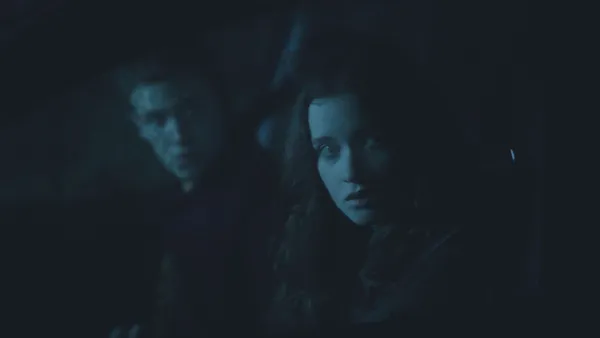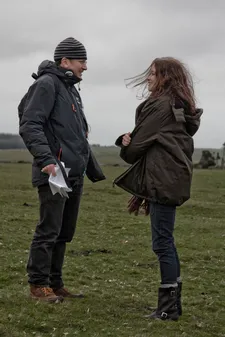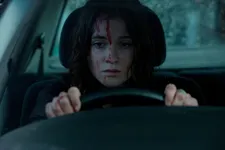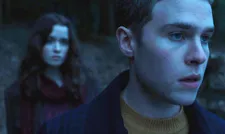 |
| Iain De Caestecker and Alice Englert as Tom and Lucy. 'They were genuinely scared.' |
"It's not like this is the first film that I've tried to get off the ground, there have been other ones," he says, "I spent a year in America believing everything that was said by 11 producers - and one of them was a celebrity producer. It was never going to happen. But it was some years back and I was quite guileless and naive as many British directors are who go to Hollywood on the promise of something and it didn't happen. And that's a year of your life, gone. More importantly, it's not like you instantly next day have another film project that you can get off the ground.
"Also, I live off what I earn, like most of us, although there are a lot in the film industry who don't. So I do have to then go off and do a job. That's why it takes so long."
The production of In Fear, which also stars Allen Leech, turned out to be quite the opposite, largely due to the concept behind the film. Lovering's plan was to keep his actors as 'in fear' as their characters, improvising much of the dialogue and not revealing the details of scenes to them before they were shot. Englert and De Caestecker only met for a couple of weeks before the rehearsals - the same length of time that their characters have been dating.
Lovering told me how it came about.
"I was doing development with a very large action adventure film with a company and you kind of instinctively know when something has just plateaued. It felt like that and I thought, I'm a director, I'm not a development person, I'm just going to make something," he said.
 |
| Jeremy Lovering and Alice Englert on the set of In Fear |
He says it was a relief to be able to move so quickly on the project.
"Development is a weird thing," he adds "Often it makes things better but sometimes it neutralises them because they become over-developed. If 20 people in a room are going, 'That's a good scene - that's it.' You kind of think, I've never been to the cinema with 20 people who agree. So, does that make it better? Or just flatter? So I think development is a curious process and it can obviously make things infinitely better or it can make them infinitely worse. Or, at its most neutral, it just can hold things up."
The process of shooting on the hoof - and frequently in the close confines of a car - sounds tough, so was there any fear on the part of the director that things might not work out?
"I was just excited all the time," he says. "I've directed enough, I know my limitations and if it went wrong I knew I had a script with me. At it's worst, if it all went wrong, I had that script. I could have made that film. It wouldn't have been the one that I made or one that I would have been as excited about but I would have found a way of doing it.
"Mainly though, within probably two days of the rehearsals it was obvious that Iain and Alice, and then Allen were going to be able to pull it off. It's a really weird feeling, you just know instantly, we're going to go on a journey and you know it will be good, we're going to find our way no matter way because of the cast.
 |
| Alice Englert. 'In the casting it was very clear to me that Alice and Iain were great just as people' |
Lovering says the improvised nature of the shoot did mean that the cast had a level of tension that helps the genre scares to come of.
"They didn't know whether their character was going to be killed on day two," he says. "They didn't know the story, they didn't know if they were 'good' or 'bad' or if the person they were with was 'good' or 'bad', so they had real suspicion or trust issues from the word go. That made them on edge in a good way.
"Then I started playing tricks on them, playing mind games and physically games as well. So they were physically prepared for something bad to happen all the time and they were mentally prepared for something bad to happen all the time. They were genuinely scared."
Lovering recalls a moment where Lucy is wrenched from the car - a situation he had had fully risk-assessed as Englert has a long-standing knee injury - but it was De Caestecker whose reaction was most surprising.
"Tom, ie Iain, just went into shock," he says. "It was quite extraordinary. He started shaking, his temperature dropped, so that was a very physical thing. I'm like, 'Just take a warm blanket and have a cup of tea, you're not really in a life-threatening situation'."
That may sound a bit callous - and cinema history is littered with stories of directors traumatising their cast in the name of a good shot - but Lovering says he was quite careful not to push things too far and felt very uncomfortable when, at another more shocking point in the script, Englert was so genuinely upset that she ended up sobbing.
"I thought, I've now gone over to territory that I don't want to be in," he says. "The Lars von Trier thing, it's definitely a reference and I think, Christ, I don't want to go there. Ken Loach, you know, I never want to go there in terms of some reputed incidences, Linda Blair in The Exorcist - we know them all, there are many instances where directors have used tricks.
 |
| Alice Englert and Iain De Caestecker in In Fear |
"My only question was with von Trier's Dancer In The Dark because Bjork was not an actor. I really don't believe she totally pre-empted what she was going to go to. Even if, within ours, I had really been significantly cruel to them, I think they would have got it. They probably would have said, 'Look, you've crossed the line.'"
Since making In Fear, Lovering has also turned his hand to an episode of Sherlock, which he describes as "terrifying", adding: "With In Fear, you're creating an audience but with Sherlock, there's a fan base that you're responsible to and that's much more frightening."
Looking to the future, though, he's hoping that more big-screen work will be coming this way.
"I really want to do films but it's hard at the moment, it's very risk-averse and hard to get things off the ground. The thing about this project, because it was so quick is that I haven't got something lined up, which is annoying on one level. The good thing about development hell is that when you get to make the film, there's something else in development hell that you then can make after. I look at those directors with envy. I'm not in that position right now."
That said, he is looking at a remake of Peter Medak's 1980 ghost story The Changeling, which he also described as "terrifying because it's such a classic film".
"It's the original producers and I'm writing a treatment for them just to see if I can work out a way," he says. "There's an existing script, which is a remake script, but what I've said to them is that I'll do the original film but I'll do it from a different character's point of view. I'll do the same scenes and the ones in between.
"We're very Victorian in our attitude to ghosts and I think if you take the eastern philosophy of ghosts, where there's about 150 levels of spirit, and play with that, then I think there could be something interesting there. I think the ghost in The Changeling was interesting to explore because it was malevolent and benign, childish and mature, physical and non-physical. So I think there is an area to look at that character of the ghost in a different way, without it just being making a remake of a perfect film. It is a meditation on grief and my film would be that."
In Fear is in cinemas across the UK from today. For details of venues visit the Facebook page. For more information about the film, visit www.infearmovie.com. The film will be released in the US in the coming months.
























